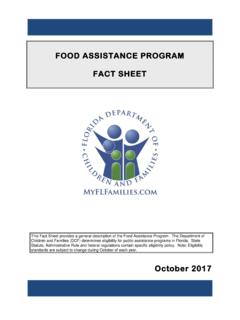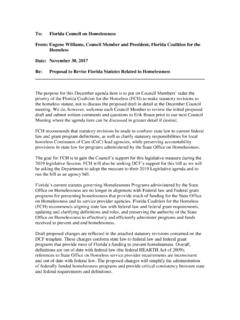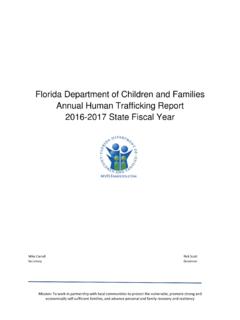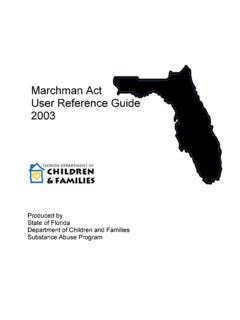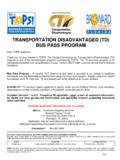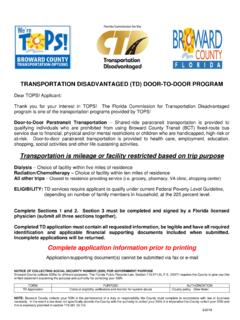Transcription of TEMPORARY CASH ASSISTANCE - Florida …
1 TEMPORARY CASH ASSISTANCE FACT SHEET Automated Community Connection to Economic Self-Sufficiency (ACCESS) staff in the Department of Children and Families (DCF) prepared this fact sheet to give a general description and explanation of the TEMPORARY Cash ASSISTANCE Program (TCA). The Department determines eligibility for public ASSISTANCE programs in Florida . Specific eligibility policy is available in federal regulations, state statute or administrative rule. Note: ACCESS updates this fact sheet when eligibility standards change. July, 2012 DEPARTMENT OF CHILDREN AND FAMILIES AUTOMATED COMMUNITY CONNECTION TO ECONOMIC SELF-SUFFICIENCY (ACCESS) The ACCESS Program provides financial and medical ASSISTANCE , food ASSISTANCE , and other supportive services to needy persons and families.
2 Each program has eligibility requirements from state or federal law. Apply for ASSISTANCE at , by calling the statewide call center at 1-866-762-2237 or by contacting your local Children and Families ACCESS Service Center or local Community ACCESS partner site. TEMPORARY Cash ASSISTANCE (TCA) Program Description The TCA program provides cash ASSISTANCE to families with children under age 18 (or under age 19 if they are full time students in a secondary school or its equivalent) that meet the program s technical, income, and asset requirements. TCA helps families become self-supporting so that children may remain in their own homes or the homes or relatives. Pregnant women in their third trimester of pregnancy may also be eligible to receive TCA if their physician restricts them from work.
3 Otherwise, TCA eligibility is available in the ninth month of pregnancy. Work Requirements Regional Workforce Boards (RWB) provide work activities and services necessary for participants to obtain or retain employment. TCA recipients must participate in work activities unless they meet the following exemptions from work. Individual has a child under three months of age, Individual receives SSI or Social Security disability benefits, Individual is not work eligible by federal regulations definition. Example: Individual must be in the home full-time to care for a disabled family member, or Individual is exempt from the time limit. Time Limits Individuals may receive cash ASSISTANCE for a lifetime cumulative total of 48 months as an adult.
4 Page 2 A family that receives cash for a child only has no time limit. Pending SSI/SSDI applicants and individuals with RWB-approved hardships may receive extensions to the 48-month lifetime limit. Caretaker relatives who do not request benefits for themselves may receive non-time limited TCA benefits for relative children. An adult household member who provides care to a disabled family member in their home may receive non-time limited TCA benefits for the months they provide care. Family Cap The program limits additional TCA benefits for a child born to a current TCA recipient. For the first child born more than 10 calendar months from the date of application for TCA, the family receives one half of the normal increase for an added person.
5 For any additional children born to a TCA recipient, the family receives no increase. This provision does not apply to a first-born child, when courts transfer legal custody of a child, when the children no longer live with their parents due to death or incapacitation, or when the mother is a recipient of SSI. Learnfare To remain eligible for TCA: School-age children (six to 18) must attend school, and Parents or caretaker relatives must participate in school conferences. Families will lose benefits for any child who is habitually truant from school or who is a school dropout unless the child has good cause for non attendance or a hardship exemption from the school.
6 Parents or caretaker relatives must have a conference with a school official each semester to discuss the child s school progress. A parent or caretaker relative will lose their portion of the benefits if they fail participate in a school conference without good cause . Immunization To receive TCA for children under age five, the applicant household must verify that each child has a complete record of all necessary immunizations or is current with immunizations. Residency and Citizenship Individuals must be US citizens or qualified noncitizens. Individuals must be residents of Florida . A resident is an individual who lives in the state for purposes other than vacation, and intends to remain.
7 Social Security Number Everyone applying for TCA must have a social security number or proof of application for one. Individuals who are not requesting benefits for themselves do not have to provide a number or proof of application for one. Page 3 Assets Assets are resources or items of value owned (solely or jointly) by an individual with access to the cash value of the assets. Households may have $2,000 in countable assets. Homestead property value does not count toward the asset limit. Licensed vehicles for individuals with a TCA work requirement may not exceed a combined equity value of $8,500. Vehicle equity value in excess of $8,500 counts toward the $2,000 asset limit.
8 Families without a work requirement may exclude one vehicle with an equity value of no more than $8,500. Eligibility rules exclude vehicles used to transport a physically disabled member of the ASSISTANCE group from asset consideration. Income Eligibility for TCA depends on household income. Net countable income (income minus allowable deductions) cannot exceed the maximum possible payment for the family size. (See TCA benefit chart below.) Relationship A child must live in the home of a parent or a relative who is a blood relative of the child. The degree of relationship to the child can be no greater than first cousin once removed. Parents and children, including half-siblings, who live together must apply together.
9 Child Support Enforcement Custodial parents or the caretaker relative applicants must cooperate with the state s child support enforcement program to identify and locate the non-custodial parent(s), establish the paternity of the child and obtain child support payments for the child. Relocation ASSISTANCE Eligible families that need resources to escape domestic violence, move to another area with greater employment opportunities, or to accept a job offer, may choose a lump sum relocation payment instead of a monthly TCA benefit. Families that accept the relocation payment for employment related reasons may not reapply for TCA for six months, unless they have an emergency.
10 If these families reapply within six-months they must repay a prorated amount of the relocation ASSISTANCE payment. RWBs determine eligibility for relocation ASSISTANCE . Page 4 Up-front Diversion Up-front diversion is a one-time payment of up to $1000 to help families facing an unexpected emergency. A family receives this payment instead of ongoing TCA. An up-front diversion payment is available to TCA-eligible families that: Meet certain up-front diversion eligibility requirements, Agree not to apply for TCA for three months, unless they have an emergency, and Receive approval for the payment from the RWB. If the family has an emergency and re-applies within three months of the diversion payment, it must repay the entire diversion payment through eight months of a prorated reduction to the TCA grant.
